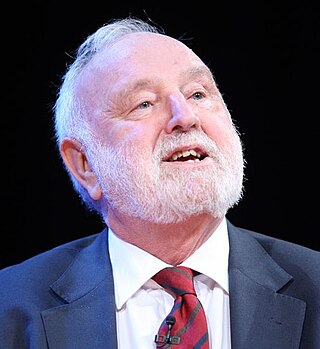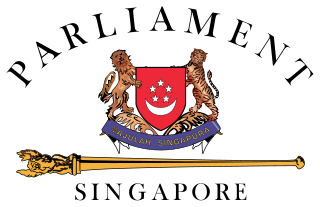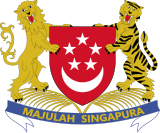
Frank Gordon Dobson was a British Labour Party politician. As Member of Parliament (MP) for Holborn and St. Pancras from 1979 to 2015, he served in the Cabinet as Secretary of State for Health from 1997 to 1999, and was the Labour Party nominee for Mayor of London in 2000, finishing third in the election behind Conservative Steven Norris and the winner, Labour-turned-Independent Ken Livingstone. Dobson stood down from his Parliament seat at the 2015 general election.

The Workers' Party is a major centre-left political party in Singapore and one of the three contemporary political parties represented in Parliament, alongside the governing People's Action Party (PAP) and the opposition Progress Singapore Party (PSP). It is currently the largest and oldest opposition party in Parliament, having contested every parliamentary election since 1959 against the dominant PAP. The WP is the only political party other than the PAP with elected Members of Parliament (MPs) since the 1991 general election.

Ann Lloyd Keen is a British Labour Party politician, who served as Member of Parliament (MP) for Brentford and Isleworth from 1997, until she was defeated by Conservative candidate Mary Macleod in 2010. In 1999, The Guardian newspaper revealed that she had acted as a "secret go-between" for the Labour Party and Shaun Woodward, at the time the MP for Witney, as he attempted to defect from the Conservative Party in the same year.

Julie Kirkbride is a British Conservative politician. She was the Member of Parliament for the Conservative stronghold of Bromsgrove from the 1997 to the 2010 general elections.

The Parliament of Malaysia is the national legislature of Malaysia, based on the Westminster system. The bicameral parliament consists of the Dewan Rakyat and the Dewan Negara. The Yang di-Pertuan Agong (King), as the head of state, is the third component of Parliament.

A political surgery, constituency surgery, constituency clinic, mobile office or sometimes advice surgery, in British and Irish politics, is a series of one-to-one meetings that a Member of Parliament (MP), Teachta Dála (TD) or other political officeholder may have with their constituents. At a surgery, constituents may raise issues of concern or request assistance in regard to local or national government matters. Often the constituent's issue will be followed up by a caseworker or assistant. Surgery meetings are usually confidential in contrast to town hall meetings, which are open to many people at the same time.

A Nominated Member of Parliament (NMP) is a member of the Parliament of Singapore who is appointed by the president. They are not affiliated to any political party and do not represent any constituency. There are currently nine NMPs in the Parliament.

The Cabinet of Singapore forms the executive branch of the Government of Singapore together with the President. It is led by the Prime Minister who is the head of government. The prime minister is a Member of Parliament (MP) appointed by the president who in the president's judgment is likely to command the confidence of the majority of the Members of Parliament (MPs). The other Ministers in the Cabinet are Members of Parliament appointed by the president acting in accordance with the advice of the prime minister. Ministers are prohibited from holding any office of profit and from actively engaging in any commercial enterprise.

A Non-constituency Member of Parliament (NCMP) is a member of an opposition political party in Singapore who, according to the Constitution and Parliamentary Elections Act, is declared to have been elected a Member of Parliament (MP) without constituency representation, despite having lost in a general election, by virtue of having been one of the best-performing losers. When less than 12 opposition MPs have been elected, the number of NCMPs is the difference to total 12. NCMPs enjoy all of the privileges of ordinary members of Parliament, apart from the salary, which is substantially lower.

The Parliament of Singapore is the unicameral legislature of the Republic of Singapore, which governs the country alongside the president of Singapore. Largely based upon the Westminster system, the Parliament is made up of Members of Parliament (MPs) who are elected, as well as Non-constituency Members of Parliament (NCMPs) and Nominated Members of Parliament (NMPs) who are appointed. Following the 2020 general election, 93 MPs and two NCMPs from three political parties were elected to the 14th Parliament. Throughout the sitting of Parliament, nine NMPs are usually appointed by the president on a biennial basis.

The Constitution of the Republic of Singapore is the supreme law of Singapore. A written constitution, the text which took effect on 9 August 1965 is derived from the Constitution of the State of Singapore 1963, provisions of the Federal Constitution of Malaysia made applicable to Singapore by the Republic of Singapore Independence Act 1965, and the Republic of Singapore Independence Act itself. The text of the Constitution is one of the legally binding sources of constitutional law in Singapore, the others being judicial interpretations of the Constitution, and certain other statutes. Non-binding sources are influences on constitutional law such as soft law, constitutional conventions, and public international law.

The People's Association (PA) is a statutory board under the Ministry of Culture, Community and Youth (MCCY) of the Government of Singapore that oversees neighbourhood communities and social organisations. Established in 1960, it was part of a nation-building programme to promote social cohesion and multiracialism.

A group representation constituency (GRC) is a type of electoral division or constituency in Singapore in which teams of candidates, instead of individual candidates, compete to be elected into Parliament as the Members of Parliament (MPs) for the constituency. Synonymous to the party block voting (PBV) or the general ticket used in other countries, the Government stated that the GRC scheme was primarily implemented to enshrine minority representation in Parliament: at least one of the MPs in a GRC must be a member of the Malay, Indian or another minority community of Singapore. In addition, it was economical for town councils, which manage public housing estates, to handle larger constituencies.

The 11th Parliament of Singapore was the previous Parliament of Singapore. The first session commenced on 2 November 2006 and was prorogued on 13 April 2009. The second session commence from 18 May 2009 and was dissolved on 19 April 2011. The membership was set by the 2006 Singapore General Election on 7 May 2006, and it has changed twice due to the deaths of Jurong GRC MP Dr Ong Chit Chung in 2008, and Ang Mo Kio GRC MP Balaji Sadasivan who was also the Senior Minister of State for Foreign Affairs.

The right to vote in Singapore is not explicitly stated in Singapore's Constitution, but the Government has expressed the view that it may be inferred from the fact that Singapore is a representative democracy and from specific constitutional provisions, including Articles 65 and 66 which set out requirements for the prorogation and dissolution of Parliament and the holding of general elections. Speaking on the matter in Parliament in 2009, the Minister for Law, K. Shanmugam, said that the right to vote could not be a mere privilege as this would imply the existence of an institution superior to the body of citizens that is empowered to grant such a privilege, but that no such institution exists in a free country. In 1966 a Constitutional Commission chaired by Chief Justice Wee Chong Jin advocated entrenching the right to vote within the Constitution, but this was not taken up by the Parliament of the day. When this proposal was repeated during the 2009 parliamentary debate, the Government took the view that such entrenchment was unnecessary.

Singapore has a multi-party parliamentary system of representative democracy in which the President of Singapore is the head of state and the Prime Minister of Singapore is the head of government. Executive power is vested in the President and the Cabinet. Cabinet has the general direction and control of the government and is collectively responsible to the Parliament. There are three separate branches of government: the legislature, executive and judiciary.

The Separation of powers in Singapore is governed by Constitution of the Republic of Singapore, which splits the power to govern the country between three branches of government – the parliament, which makes laws; the executive, which executes them; and the judiciary, which enforces them. Each branch, while wielding legitimate power and being protected from external influences, is subject to a system of checks and balances by the other branches to prevent abuse of power. This Westminster constitutional model was inherited from the British during Singapore's colonial years.

By-elections in Singapore are elections held to fill seats in the Parliament of Singapore that fall vacant in between general elections, known as casual vacancies. In the past, the Government of Singapore took the position that the Prime Minister had discretion whether or not a by-election should be called to fill a casual vacancy in a Single Member Constituency, and could leave a parliamentary seat unfilled until the next general election. However, in the case of Vellama d/o Marie Muthu v. Attorney-General (2013), which arose from a vacancy in Hougang Single Member Constituency, the Court of Appeal held that the Constitution of Singapore obliges the Prime Minister to call a by-election unless a general election is going to be held in the near future. However, a by-election need only be called within a reasonable time, and the Prime Minister has the discretion to determine when it should be held.

In Singapore, a town council (TC) is an entity formed by at least one elected Member of Parliament (MP) and appointed residents who are responsible for the day-to-day operations in managing the common property of the Housing and Development Board (HDB) residential flats and commercial property within the town. The sizes and structure of a town council can be changed due to political electoral changes. It is often considered a very limited form of local government that are strictly limited to estate management, and where their members have no separation of powers from the national government. As of November 2020, there are 17 town councils operating in Singapore.

Matthew Alexander Vickers is a British politician serving as the member of Parliament (MP) for Stockton South since 2019, and Deputy Chairman of the Conservative Party since July 2022.













